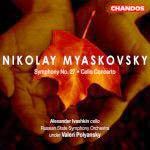
Symphony No. 27, Op. 85 / Concerto for Cello and Orchestra, Op. 66
 $40.00
Out of Stock
$40.00
Out of Stock6+ weeks add to cart
MYASKOVSKY
Symphony No. 27, Op. 85 / Concerto for Cello and Orchestra, Op. 66
Alexander Ivashkin (cello) / Russian State Symphony Orchestra. Valeri Polyansky
[ Chandos Classics / CD ]
Release Date: Friday 4 October 2002
This item is currently out of stock. It may take 6 or more weeks to obtain from when you place your order as this is a specialist product.
***** Five Stars BBC Music Magazine (Jan 03)
"Symphony No 27 is given a reading to match its nobility and proud assertion of a Russian symphonic tradition that goes back, predominantly, to Tchaikovsky. Superbly played and recorded."
"Symphony No 27 is given a reading to match its nobility and proud assertion of a Russian symphonic tradition that goes back, predominantly, to Tchaikovsky. Superbly played and recorded."
***** Five Stars BBC Music Magazine (Jan 03)
'This is, in short, one of the finest recordings to come my way in a good while, almost every bar glows with an unforced, deeply felt emotion.'
International Record Review
This is the only available recording of Symphony No. 27, the composer's last. The work is highly romantic, reminiscent of Tchaikovsky and Rachmaninov, with rich, colourful orchestrations, striking melody and strong, contrasting rhythms.
Myaskovsky's Cello Concerto is undoubtedly the composer's most famous work: powerfully atmospheric, hauntingly nostalgic, melodic and completely individual.
Alexander Ivashkin, Valeri Polyansky and the Russian State Symphony Orchestra are renowned for their interpretations of Russian music and have made many outstanding recordings for Chandos.
Nikolay Myaskovsky is often hailed as the father of the Soviet symphony. A pupil of Glière, Rimsky- Korsakov and Lyadov, he remained essentially conservative, despite elements of innovation in his first published compositions. His early works, written before the revolution, are complex and pessimistic, heavily marked by chromaticism. These features persist to some degree in some of his later symphonies but under the exigencies of socialist realism, Myaskovsky was forced constantly to adapt his musical thinking. During the 1930s this meant treading carefully since any adverse criticism from the communist hierarchy could well prove fatal.
Symphony No. 27 was Myaskovsky's final essay in the genre and he died before its first performance. It looks back quite unapologetically to the great nineteenth-century tradition of Tchaikovsky, the Mighty Handful, and especially Glazunov and Rachmaninov. The language of the three-movement work might be stylistically anachronistic but this is also the work's strength. Every listener finds the style immediately familiar and for that reason it served Myaskovsky well as a means of putting over his own ideas in a way that could be most directly understood.
The Cello Concerto in C minor won immediate popularity with Russian audiences, and has subsequently become one of the composer's best-loved works. Premiered only a few months before the end of the Second World War, it is almost certainly a profound emotional response to the horrors of the conflict. But Myaskovsky takes a very personal approach that is far from the patriotic jingoism that we find in other works of the period. Instead of the brilliant virtuoso style of the traditional concerto, Myaskovsky demands from his soloist utmost sensitivity, warmth of expression and perfect cantabile playing and the work ends with a quiet and very personal restatement of its opening theme .
Tracks:
Symphony No. 27, Op. 85 in C minor
Concerto for Cello and Orchestra, Op. 66 in C minor


